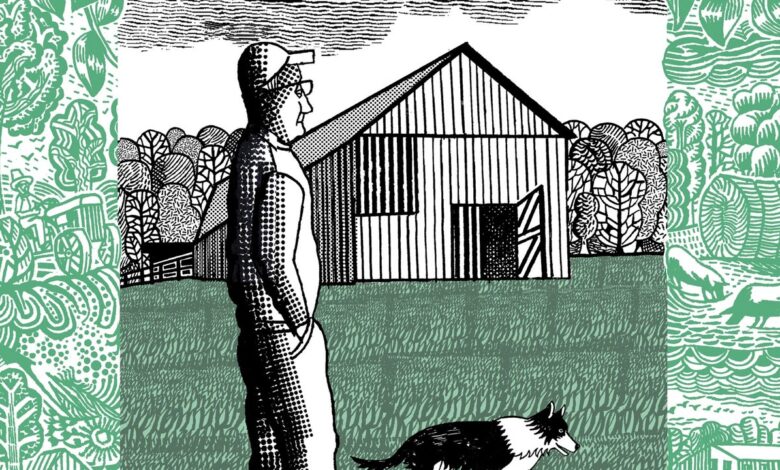Wendell Berry’s Recommendation for a Cataclysmic Age

Content material
This content material will also be considered at the website it originates from.
Hidden within the woods on a slope above the Kentucky River, simply south of the Ohio border, is a twelve-by-sixteen-foot cabin with a protracted entrance porch. If no longer for the concrete pilings that carry the development prime off the bottom, it could appear virtually a dwelling a part of the woodland. Readers around the globe know the “long-legged area” because the position the place Wendell Berry, as a twenty-nine-year-old married guy with two small children, discovered his voice. As he defined in his essay through that identify, he constructed the cabin in the summertime of 1963—a spot the place he may just write, learn, and ponder the legacies of his forebears, and what inheritance he may go away in the back of.
The cabin started as a log area constructed through Berry’s great-great-great-grandfather Ben Perry, probably the most space’s first settlers, and it lived on as a multigenerational salvage operation. Within the nineteen-twenties, with the unique area in disrepair, Wendell’s bachelor great-uncle Curran Mathews painstakingly took aside what remained and used the lumber to make a camp alongside the Kentucky River, the place he may just break out “the limits of the authorized.” Wendell, “a melancholic and rebellious boy,” discovered peace within the tumbledown camp, even supposing it flooded each and every time the river overflowed. In the end, it become uninhabitable, and he pried off some poplar and walnut forums to make use of in development his personal cabin, on upper floor—a “enough nutshell of a area,” he wrote. Status on its lengthy legs, it had “a peering, aerial glance, as even though constructed below the affect of bushes.”
Berry, who’s eighty-seven, has written fifty-two books there—essays, poetry, quick tales, and novels—maximum of them whilst additionally operating a farm, instructing English on the College of Kentucky, and attractive in political protests. This summer time, he’ll post a sprawling nonfiction guide, “The Want to Be Complete,” adopted through a short-story assortment within the fall.
Remaining October, Berry confirmed me the camp, asking handiest that I no longer say the place it’s. Despite the fact that he has laid naked his complete existence in print, he tightly guards his privateness. The one room, containing an vintage woodstove in opposition to the again wall and a smartly made cot in a single nook, used to be ruled through his worktable, set sooner than a forty-paned window—“the attention of the home”—that appears out onto the porch, the woods, and the river beneath.
The camp has no plumbing or electrical energy. Part a dozen well-sharpened pencils had been coated up at the worktable, along small stacks of paper. On best of 1 stack used to be a notice Berry had made, and crossed out, about Marianne Moore’s poem “What Are Years?” Above a small secure, curling images had been taped to a wall: Wallace Stegner, Ernest Gaines, Donald Corridor and Jane Kenyon, Thomas Merton. Berry identified a younger shot of his spouse, Tanya, with cropped, wavy hair, striding alongside a hillside through their area. He had made a fowl feeder and fixed it to the porch railing, so he may just watch the comings and goings of chickadees, titmice, juncos, and jays. I remembered a line from “The Lengthy-Legged Area”: “One vibrant heat day in November it used to be so quiet that I may just pay attention the fallen leaves ticking, like a gentle rain, as they dried and shrunk, scraping their issues and edges in opposition to each and every different.”
Where used to be so inviting, I puzzled if any individual had ever damaged in—in search of, most likely, just a little meals and a furtive evening’s leisure. “Sure, as soon as,” Berry stated. He used to be beautiful certain he knew the offender. “Any individual took out a couple of panes and attempted to get into my secure. I wrote him a notice—‘Expensive Thief, if you happen to’re in bother, don’t tear this position up. Come to the home, and I’ll come up with what you want.’ ”
From this sliver of vanishing The usa, Berry cultivates the retro virtues of neighborliness and compassion. He divides his time between writing and farmwork, proceeding his vocation of championing sustainable agriculture in a rustic fuelled through business behemoths, whilst striving to insure that rural American citizens—a mocked, despised, and ever-dwindling minority—don’t perish altogether. Each time the rustic struggles with a brand new man-made emergency, Berry is rediscovered. A Twitter feed known as @WendellDaily lately circulated one among his maxims: “Rats and roaches are living through festival below the regulation of provide and insist; it’s the privilege of human beings to are living below the rules of justice and mercy.”
Berry’s admirers name him an Isaiah-like prophet. Michael Pollan and Alice Waters say that he modified their lives with 5 phrases: “Consuming is an agricultural act.” Pollan become a pandemic of the beef trade, genetically changed meals, and manufacturing unit farms; Waters introduced the farm-to-table motion. The cultural critic bell hooks, every other Kentuckian, started studying Berry in school, discovering his paintings “essentially radical and eclectic.” A long time later, she visited him at his farm to speak about the significance of house and group and the complexities of The usa’s racial divide.
Berry’s critics see him as a utopian or a crank, a Luddite who by no means met a technological innovation he admired. In “Why I Am Now not Going to Purchase a Pc,” an notorious 1987 essay that ran in Harper’s, he introduced, “I don’t see that computer systems are bringing us one step closer to anything else that does subject to me: peace, financial justice, ecological well being, political honesty, circle of relatives and group balance, just right paintings.” When angry readers despatched a snowfall of letters to the editor, Berry famous in answer that one guy, who known as him “a idiot” and “doubly a idiot,” had “thankfully misspelled my identify, leaving me a speck of hope that I’m really not the ‘Wendell Barry’ he used to be speaking about.”
I first heard of Wendell Berry when I used to be ten years previous. One night in 1964, my father, Dan Wickenden, got here house from his editorial place of job at Harcourt Brace, in midtown Big apple, and described his new creator: a lanky early life of thirty, who sat together with his elbows on his knees, speaking in a gradual Kentucky cadence and gesturing with massive, expressive fingers. A picture lodged in my thoughts—busy males in darkish fits, their secretaries typing and taking dictation, whilst Berry instructed fun tales in bluejeans and scuffed sneakers. (Tanya disabused me of that a part of the reminiscence: “Khakis, possibly. Now not bluejeans.”)
I remembered this stumble upon no longer way back after I pulled from a bookshelf “A Steady Team spirit,” a selection of Berry’s essays that my father edited in 1971. With its homely brown jacket and yellowing pages, it seemed its age, but it spoke urgently to our present compounding crises. Some of the items, “Suppose Little,” introduced, “Just about each and every one among us, just about each day of his existence, is contributing at once to the wreck of this planet.” Berry went on to mention that he used to be “ashamed and deeply distressed that American govt must have change into the manager explanation for disillusionment with American rules.”
I used to be inquisitive about Berry’s evolution from a self-described “small creator” into an across the world acclaimed guy of letters. After my father died, my mom xeroxed his correspondence with Berry and gave it to me—a pile of letters that lined the years they labored in combination, 1964 to 1977. The 2 had been properly matched. My circle of relatives lived quite austerely in what Dan known as “exurban” Connecticut, the place he chopped picket for our fireside and tended an natural vegetable lawn. His father, Leonard Wickenden, a chemist, have been writing for many years in regards to the risks of fertilizers and insecticides. Dan and Wendell shared a love of the land, a droll wit, and a punctilious dedication to right kind utilization. Dan wrote to Wendell a few load of horse manure that had simply been delivered for his lawn. Wendell tutored Dan within the mating behavior of toads: “Infrequently the male is located nonetheless clinging to the useless feminine who has perished in his include.”
There have been moments of hysteria, as there at all times are between creator and editor. In July, 1966, as Berry entered the 7th yr of seeking to tame his unwieldy novel “A Position on Earth,” my father introduced him with “intensive tips” for excision, notifying him that, “except additional and slightly drastic cuts are made, the guide in print might be some 672 intently set pages.” Wendell spoke back, “Let me make myself completely transparent. I’m damned in doubt that I’ll lower anything else like 100 extra pages out of this guide.” But, he added, “if I stay discovering such a lot to trust to your court cases I must get the MS again and rewrite it from one finish to the opposite.”
#Wendell #Berrys #Recommendation #Cataclysmic #Age





